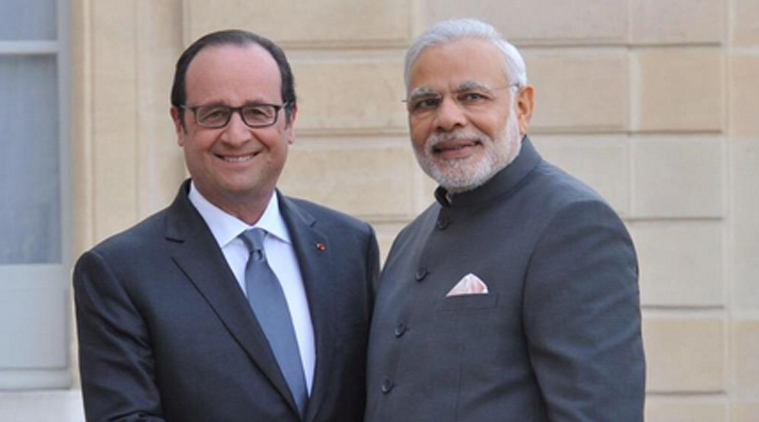Why is French President Francois Hollande in India?
PM Modi and Francois Hollande

NEW DELHI: Last year, US President Obama visited India on a 3-day-trip to grace the Republic Day ceremony. This year, it is French President Francois Hollande. This is the fifth time that a serving President of France will be the Chief Guest at India’s Republic Day function.
Earlier leaders from France had been the Chief Guest on January 26 in 1976, 1980, 1998 and 2008 respectively. But for the first time in India’s history, foreign troops (French troops) will be participating in the Republic Day parade. Earlier, the Indian troops had participated in the Bastille Day celebrations in France in 2009.
Meanwhile, New Delhi has been put on high alert after Intelligence Bureau warned of a possible terror attack by dreaded terror outfit Islamic State (ISIS) during Holland’s visit. A total of 10,000 paramilitary personnel, in addition to 80,000-strong Delhi Police, will be on the job in the national capital to ensure greater security to VVIPs. In a nationwide crackdown just days ahead of Republic Day, at least six “recruits” were arrested and a dozen placed under watch for being Islamic State (IS) sympathisers.
Interestingly, before the 2014 elections, Narendra Modi had been shunned by France for his alleged engagement in the Gujarat violence. Relations between the two countries normalized when PM Modi paid visit to France in April last year, choosing it to be the first European country to visit.
Nevertheless, the change of tract by France has been dictated by the leading priorities in trade and diplomatic engagements, particularly the sale of 36 Rafale fighters as well as the supply of six Areva-built EPR nuclear reactors. India’s desire to purchase 36 Rafale combat planes for its air force, is high on the agenda, which PM Modi had announced during a visit to Paris in April but which has since been stuck on price considerations.
The cordial relations between Paris and New Delhi are not nascent. During 1998 when India had carried out a series of underground nuclear-tests, France had vetoed the UN Sanctions against India and also supported India’s application to join the select Nuclear Suppliers Group.
It must be noted that France is an Indian Ocean power, with a medium-sized military presence but a vast exclusive economic zone (EEZ), as well as a longstanding sphere of influence in the southwestern quadrant of the Indian Ocean. France’s interest in helping preserve stability in the Indian Ocean is aptly summarized in the 2013 French White Paper, which describes the Indian Ocean as a transit region for international trade, and “at the heart of world strategic challenges.”
Currently, Paris and New Delhi are seeking to enhance their cooperation in the domain of maritime activities as well as intelligence gathering. France has also promised support for India’s clean-energy quest, including a solar energy alliance launched last month during the global climate talks held in Paris.
Both countries have been hit by militants recently, with 130 people killed across Paris on November 13 and a four-day siege against the north Indian air force base of Pathankot this month in which seven Indian soldiers were killed. Condemning the recent Pathankot attacks, President Hollande stated, “India and France are confronted with similar threats: we are attacked by murderers who pretend to act on religious basis. Their real objective is widespread hate. They want to undermine our democratic values and our way of life. India and France are united in their determination to act together against terrorism.”
Meanwhile, The Union government has signed an agreement with French company, Areva, to install four nuclear reactors of a collective capacity of 9,900 MW at Jaitapur. The activists protesting against the Jaitapur nuclear project in Maharashtra are likely to revive their protest in view of the French President Francois Hollande’s forthcoming visit.
Thus, amidst the likely terror attacks of ISIS, the negotiation of Rafale deals and the protests at Jaitapur, the visit of French President will definitely be interesting.
(The writer is a PhD scholar in Jawaharlal Nehru University, New Delhi)



